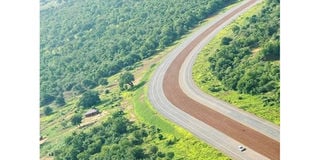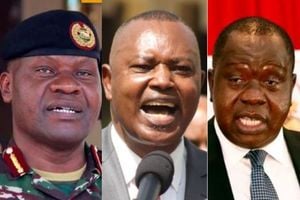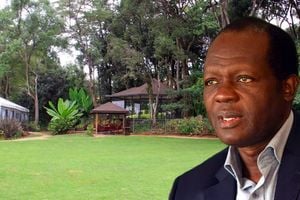South Sudan: Destined to succeed despite challenges
Sponsored by Stand Up Young Africa (SUYA) Foundation

A section of the new road from Juba to Bor, South Sudan.
The Republic of South Sudan is the world’s youngest nation and Africa’s 54th country. Since independence on July 9, 2011, South Sudan has continued to show positive economic recovery, with a current growth rate of approximately 3.2 percent, which marks a slight slowdown because of reduced imports due to geographic tensions in the north.
Generally, the pace of global expansion is low by historical standards, owing to issues such as high borrowing costs and withdrawal of fiscal support, long-term effects of the Covid-19 pandemic, Russia’s conflict with Ukraine, weak growth in productivity and increasing geo-economic fragmentation.
The global headline inflation is projected to decline from 6.8 percent in 2023 to 5.9 percent in 2024, whereas China’s economic growth of 4.5 percent could be the slowest since 1990. This will likely hurt the large number of advanced as well as developing economies that trade extensively with China.
Agricultural commodity prices rebounded between August 2023 and February 2024, and the IMF’s food and beverages price index gained 6.0 percent. As for the Climate change, we expect heavy rainfall and drought affecting cash-flow set aside for development in developing countries.
Thus, the decline of economic growth in South Sudan is not an isolated case. Rather, it is as a result of the global economic crisis being felt by every nation.
On May 16, 2024, a publication by the International Crisis Group (ICG) sent a warning on South Sudan’s economy being at risk due to disrupted oil exports. The report, titled “South Sudan on the Edge as it’s Neighbour’s War Disrupts Oil Exports”, warned that South Sudan was facing an economic crisis.
ICG stated that oil revenues were not only crucial for maintaining unity among South Sudan’s fractious political elites, but also represented the government’s primary source of income.
The organisation cautioned that the consequences would be severe, affecting government funds and forcing the value of the national currency to plummet.
At the same time, chronic food shortage is predicted in South Sudan due to climate change and other external factors. The current challenges felt by the country are attributed to the heavy reliance on one source of income, untapped alternative resources that include minerals, agriculture and beef, amongst others. Fiscal sources in the form of taxes and government expenditure in infrastructure are expected to stimulate growth and open up the economy for alternative investments.
Amid these challenges, all is not lost in South Sudan. The country has begun moving forward and is destined to succeed if all the citizens and friends pull together.
There is no country that develop without sacrificing its early years in infrastructure investments, that may be painful initially but with good returns later on.
The Government of South Sudan, using the available resources, is focused on developing the country by building a modern road infrastructure.
Let us draw in some facts: We have seen the construction of roads from Juba to Bor, and from Juba to Bahr El Ghazal. We have several roads at advanced stages, with the most important ones at asphalt stage. The government has successfully covered over 800km of roads built to asphalt level, and with hundreds of more kilometres being developed and are at different stages of completion.
The inter-state highways and roads are opening the country, unleashing economic development potential in South Sudan. Whereas there is need for the government to continue setting funds aside for these enormous projects to complete them, all patriotic citizens should be focused on the economic progress of South Sudan, not forgetting the journey and sacrifices the country has undertaken to get to where she is presently. We call on all citizens and friends in the diaspora to pay a visit to South Sudan and experience the growth first-hand.
The leadership of South Sudan is focused on opening up the major transport corridors as one of the single most powerful tool of empowerment across the country. These developments have already empowered the locals economically and helped them diversify their economic activities, including agriculture, mining, capacity building of artisan miners, and promotion of commercial mining, as an alternative revenue stream for the public.
The miners are locally sourced, trained and empowered economically. Plans are underway to reorganise and empower artisan miners into viable commercial groups with support for entry level modernisation and mechanisation by the government. The mining policy is under review with the aim of incorporating transparency within the Ministry Operations, where we have an existing public portal showing all activities going on in the mining sector.
We foresee exponential growth within the mining sector into a viable revenue stream for South Sudan as a country, and thousands of homesteads economically empowered in the coming months and years.
South Sudan has experienced easy access for investors and other development partners, to participate and contribute to growing her economy. Very few African countries have been able to use their resources to mobilise development at this scale on their own. South Sudan is a young nation that does not desire nor need economic mercenaries for hire, whose sole objective is to continually undermine this country’s efforts to self-develop and empower its citizens. Only sworn enemies of this country (individual entities or organised groups) can fight such a great and economically liberating cause. As Mark Twain said, “The secret of getting ahead is getting started”, and indeed, the Government of South Sudan has already started the economic liberation of its people.
Additionally, the untold story is the magnitude with which the Government of South Sudan has invested in agriculture, with the aim of mitigating the impact of climate change and empowering its citizens by providing work and food. The government has set aside an initial 5,000 hectares sample of arable land that is already undergoing an experimental large scale commercial farming, aimed at supporting thousands of the South Sudanese who will indulge in agriculture.

A portion of land under large-scale farming in South Sudan
Agriculture is the primary economic sector and source of livelihoods for most South Sudanese. The country produces a variety of crops and livestock. The crops include cotton, groundnuts, sorghum, millet, wheat, gum arabic, sugarcane, cassava, mangos, papaya, maize, simsim, bananas, sweet potatoes, and sesame. The popular livestock are cattle, sheep, goats, and fish. However, agriculture in South Sudan is significantly damaged by conflict and climate-driven shocks that affect food security and livelihoods, and hence the enormous government intervention to safeguard the livelihoods of the people.
Another quote by Mark Twain goes: “All you need in this life is ignorance and confidence, and then success is sure.” South Sudan is indeed a country to watch.


